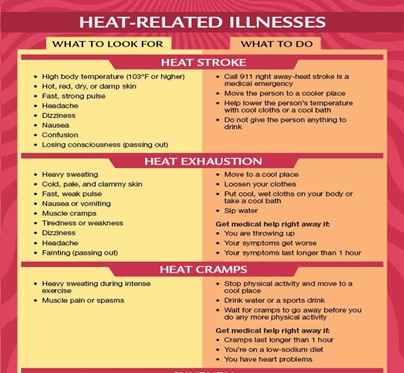Staying Healthy in Hot Weather
Older adults, who are more prone to heat stress, do not adjust as well as young people to sudden changes in temperature. Main factors that affect the body’s ability to cool itself during extremely hot weather include high humidity (i.e., when it is high, sweat does not evaporate quickly), personal factors such as age, obesity, fever, heart disease, poor circulation, prescription drug use, and alcohol use. The amount of water in the body and the acidity of one’s blood (pH) are factors.
Electrolytes and staying healthy
Electrolytes are minerals that carry an electric charge. They can be acids, bases, or salts. In nutrition, the term refers to essential minerals found in blood, sweat and urine. Sodium, calcium, magnesium, potassium, and chloride are the most common electrolytes in our bodies and are obtained from foods and fluids. They are vital to specific bodily processes. They are crucial to keeping the nervous system and muscles functioning and the internal environment balanced. They balance the amount of water in the body, balance the body’s acid/base level, move nutrients into the body’s cells, move wastes out of cells, and make sure nerves, muscles, the heart, and brain function as they should. Electrolytes are lost when one sweats. Levels of electrolytes can become too low or too high when the amount of water in the body changes. The amount of water taken in should equal the amount lost. If something upsets this balance, one may have too little water (dehydration) or too much water (overhydration). Some medicines, vomiting, diarrhea, sweating, and liver or kidney problems can upset water balance.
Some cautions drinking “sports drinks.” A person on a low-salt diet, has diabetes, high blood pressure, or other chronic conditions, should consult with one’s physician before drinking a sports beverage or taking salt tablets. Note: the “sports drinks” industry promotes a large variety of substances (check October and November 2016 Health Notes on sports drinks by entering WWURA health notes on web search). Take measures to stay cool, remain hydrated, and keep informed. The Mayo clinic suggests that one doesn’t need to rely only on water to meet fluid needs. What one eats provides a significant portion. Many fruits and vegetables (e.g., watermelon and spinach, are almost 100% water by weight). Fluid intake is probably adequate if one rarely feels thirsty and urine is colorless or light yellow.
Sources
- https://medlineplus.gov/ency/article/002350.htm
- National Center for Environmental Health (a part of CDC) https://www.cdc.gov/disasters/extremeheat/older-adults-heat.html
- https://www.mayoclinic.org/healthy-lifestyle/nutrition- and-healthy-eating/in-depth/water/art-20044256?p=1

Health Notes Author
Image
